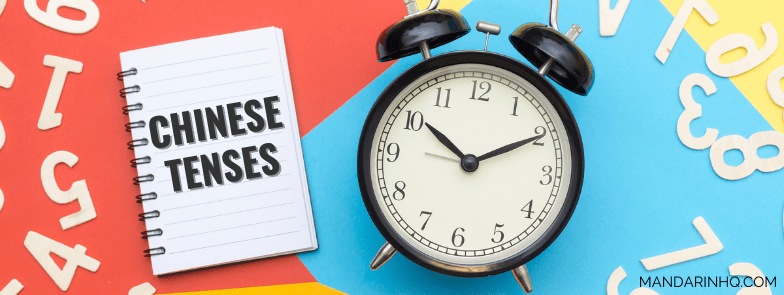It comes as a surprise to some that Mandarin doesn’t have tenses.
Unlike English and other European languages, verbs in Chinese never change form to show if an action takes place in the past, present or future.
That said, you can still express the same meaning as you do with tenses.
And, as you’ll see in this video, it’s actually pretty easy!
Add a “time phrase”
“Present Tense” Time Phrases (for actions that happen at the present time or for repeated actions)
现在 xiàn zài (now)
我们现在开始。
wǒ men xiàn zài kāi shǐ.
We start now.
每天 měi tiān (everyday)
我每天喝咖啡。
wǒ měi tiān hē kā fēi.
I drink coffee everyday.
经常 jīng cháng (often)
他经常做饭。
tā jīng cháng zuò fàn.
He often cooks.
有时 yǒu shí (sometimes)
他们有时吃中国菜。
tā men yǒu shí chī zhōng guó cài.
They sometimes have Chinese food.
总是 zǒng shì (always)
我爸爸总是早起。
wǒ bà ba zǒng shì zǎo qǐ.
My dad always gets up early.
“Past Tense” Time Phrases (for completed actions)
上周 shàng zhōu (last week)
我上周出差。
wǒ shàng zhōu chū chāi.
I went on a business trip last week.
以前 yǐ qián (before / previously / ago)
他以前是歌手。
tā yǐ qián shì gē shǒu.
He was previously a singer.
昨天 zuó tiān (yesterday)
他昨天没喝咖啡。
tā zuó tiān méi hē kā fēi.
He didn't drink coffee yesterday.
去年 qù nián (last year)
赵飞去年买房子。
zhào fēi qù nián mǎi fáng zi.
Zhao Fei bought a house last year.
十分钟前 shí fēn zhōng qián (10 minutes ago)
飞机十分钟前起飞。
fēi jī shí fēn zhōng qián qǐ fēi.
The plane took off 10 minutes ago.
“Future Tense” Time Phrases (for actions that will happen in the future)
后天 hòu tiān (the day after tomorrow)
我后天去北京。
wǒ hòu tiān qù běi jīng.
I'm going to Beijing the day after tomorrow.
下次 xià cì (next time)
他下次打扫房子。
tā xià cì dǎ sǎo fáng zi.
He will clean the house next time.
下个星期 xià gè xīng qī (next week)
我们下个星期开会。
wǒ men xià gè xīng qī kāi huì.
We are going to have a meeting next week.
明年 míng nián (next year)
我弟弟明年结婚。
wǒ dì di míng nián jié hūn.
My brother is getting married next year.
将来 jiāng lái (in the future)
她将来想当律师。
tā jiāng lái xiǎng dāng lǜ shī.
She wants to be a lawyer in the future.
Add a “signal word”
Simple Present "Do"
wǒ hē kā fēi.
我喝咖啡。
I drink coffee.
Present Progressive "Doing"
zhèng zài 正在 (in the process of…)
wǒ zhèng zài hē kā fēi.
我正在喝咖啡。
I'm drinking coffee.
zài 在 (in the process of… "在" is short form of "正在")
wǒ zài hē kā fēi.
我在喝咖啡。
I'm drinking coffee.
zhe 着 (to express that the action is ongoing, 着 (zhe) is added after a verb; it is similar to the use of -ing in English.)
wǒ hē zhe kā fēi.
我喝着咖啡。
I'm drinking coffee.
Simple Past "Did"
le 了 (completed action marker, it indicates that an action is completein a certain time frame.)
wǒ hē le kā fēi.
我喝了咖啡。
I drank coffee.
Present Perfect "Have done"
guò 过 (experienced action marker, it indicates that an experience occurred in the past.)
wǒ hē guò kā fēi.
我喝过咖啡。
I have drunk coffee.
Future "Will do"
yào 要 going to (as future auxiliary)
wǒ yào hē kā fēi.
我要喝咖啡。
I am going to drink coffee coffee.
huì 会 will (as future auxiliary)
wǒ huì hē kā fēi.
我会喝咖啡。
I will drink coffee.
You can use both a “time phrase” & a “signal word” in the same sentence.
zuó tiān 昨天 (yesterday) & le了(completed action marker)
wǒ zuó tiān hē le kā fēi.
我昨天喝了咖啡。
I drank coffee yesterday.
míng tiān 明天 (tomorrow) & yào 要 (going to, as future auxiliary)
wǒ míng tiān yào hē kā fēi.
我明天要喝咖啡。
I am going to drink coffee tomorrow.
You might also find these posts interesting:

